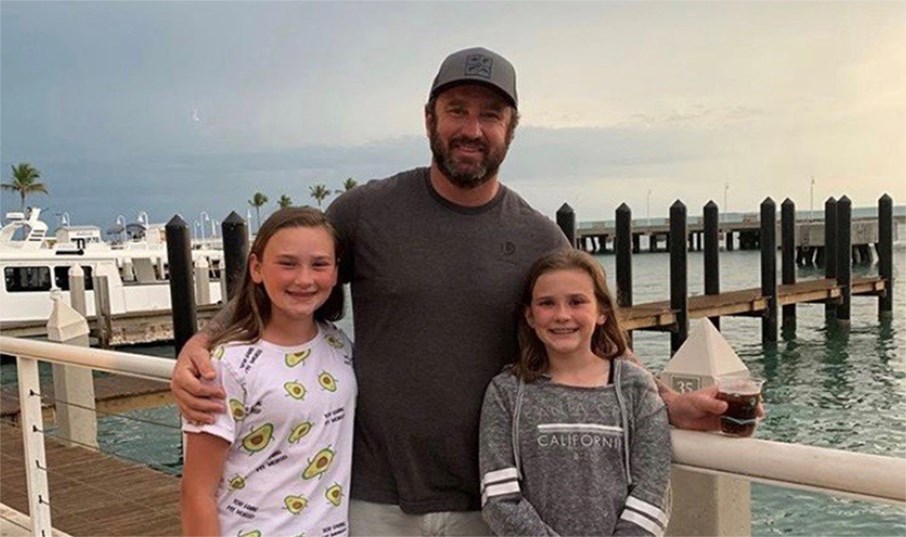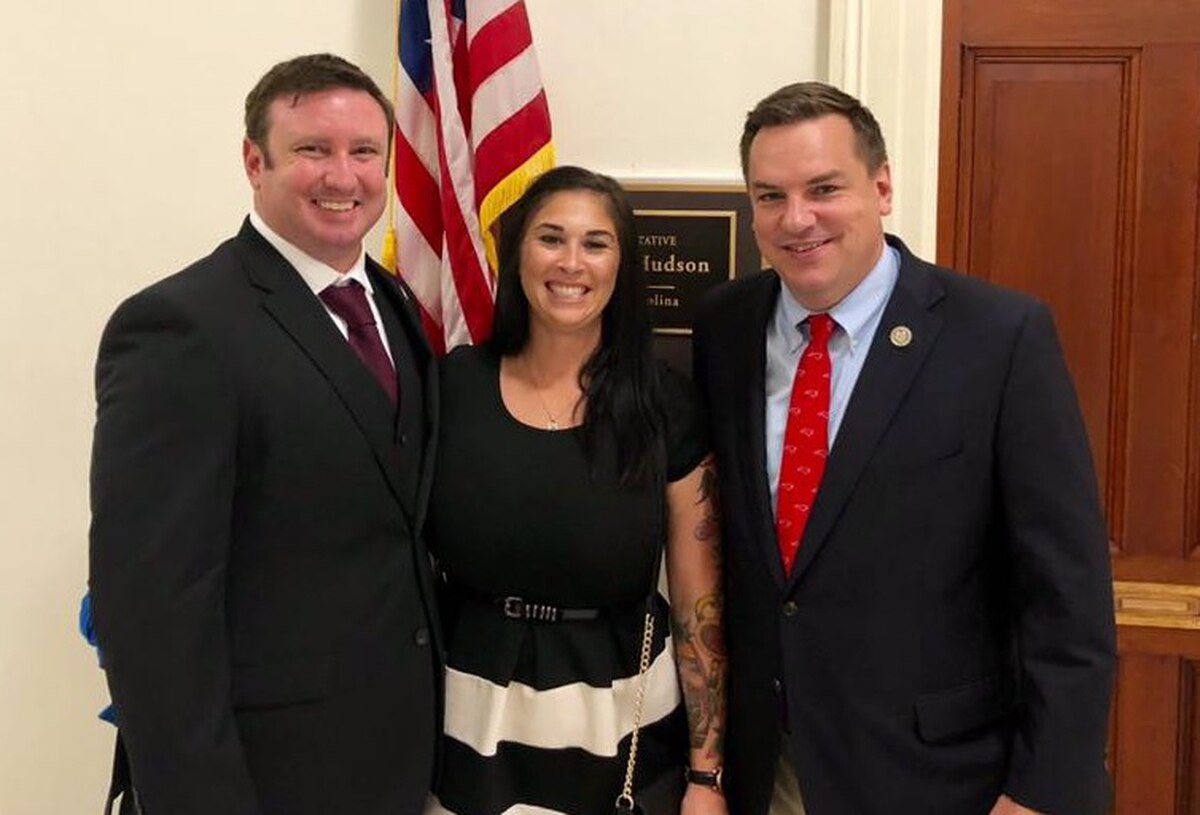
Fort Bragg soldier’s medical malpractice case makes way in annual federal budget
A Fort Bragg Green Beret soldier closed out 2019 with a compromise in his national medical malpractice case and news




VIRGINIA BEACH — Lt. Rudolph Feres parachuted into the darkness in the first hours of D-Day in 1944. He fought his way through the hedgerows of Normandy and the snows of the Bulge to the final defeat of Nazi Germany, and was highly decorated for valor.
Generations of servicemen and women since then have heard his name, but not for any of that. Instead, it has been invoked time and again to deny active-duty members of the military a right extended to nearly every other American — to sue for injuries.
Lieutenant Feres made it through some of the toughest fighting of World War II, only to be killed in a stateside barracks fire. When his widow tried to sue the Army for negligence, the Supreme Court, in a watershed 1950 ruling, laid down what became known as the Feres doctrine: The government is not liable for injuries sustained by military members on active duty.
Now, a bill before Congress is poised to knock a hole in the Feres doctrine, the first in generations. A provision that would allow troops to file claims against the military over one kind of negligence — medical malpractice — has been added to this year’s National Defense Authorization Act, the giant bill that funds the military.
The act is regarded as must-pass legislation; lawmakers from the House and Senate agreed on a final version that passed in the House on Wednesday and is expected to become law this month.
“All he did in his career, and this is what he’s known for,” said Joe Feres, the lieutenant’s nephew, who served as an Army paratrooper in Vietnam along with two brothers, and now lives in Virginia Beach. Mr. Feres flipped through yellowed newspaper clippings documenting decades of cases in which troops tried and failed to take the military to court, then sighed and shook his head.
“It bothers me,” he said. “All he went through — what we all went through — and to use the family name to deny other soldiers.”
The Feres doctrine blocks all lawsuits for injuries or deaths that occur “incident to service,” a ban the courts have applied in strikingly broad ways. Being deliberately exposed to the radiation of nuclear tests, or being secretly dosed with LSD by researchers, or drowning in an off-duty rafting trip because of a negligent guide have all been deemed injuries incident to service. So has being raped by a drill sergeant.
In one case, the Supreme Court ruled that it was incident to service when surgeons opened up a soldier’s abdomen for follow-up surgery and found a 30-inch-by-18-inch towel inside him marked “Medical Department U.S. Army,” left there from a previous operation.
The doctrine has created glaring double standards. After the midair explosion of the space shuttle Challenger, families of civilian crew members were able to file lawsuits against the government, but the family of the pilot, a Navy captain on active duty, could not. Even so, the doctrine has proved durable, surviving five Supreme Court challenges and two previous attempts in Congress to modify it.
“It’s about time” the Feres doctrine was loosened, said Dwight Stirling, a longtime senior prosecutor for the California National Guard who now heads the Center for Law and Military Policy at the University of Southern California. “For too long our troops have been treated like second-class citizens, who serve their country but are denied the rights that everyone else enjoys.”
As a prosecutor, Mr. Stirling said, he saw several victims of sexual assault attempt to seek redress in court, only to have their cases quickly dismissed because both victim and perpetrator were in the military.
“That’s when I started to realize what an injustice the Feres doctrine was,” he said. “It was being used to protect rapists.”
Paradoxically, the Feres doctrine has its legal roots in an effort by Congress to make it easier, not harder, to sue the government. The story started on a foggy morning in 1945, when an Army bomber crashed into the Empire State Building. The accident killed 14 people and injured dozens more, but the victims and their families were unable to sue because of a longstanding legal principle called sovereign immunity, which barred citizens from suing the federal government unless Congress passed a law specifically consenting to the suit.
In the public outcry that followed the crash, Congress passed the 1946 Federal Tort Claims Act, allowing a broad range of civil lawsuits against the government. But it included some exceptions, and one of them was for injuries to troops “arising out of the combatant activities.”
The following winter, Lieutenant Feres, then serving as a parachute instructor with more than 300 jumps under his belt and an infant son at home, was taking part in airborne exercises in northern New York when the boiler in his wood barracks exploded in the middle of the night, starting a fire that killed him and three other officers.
His wife, Bernice Feres, sued the Army for $100,000, claiming that the camp had failed to have a fire guard on watch that night and that the boiler was known to be faulty. Her case, and two others that followed close behind, obliged the Supreme Court to decide for the first time whether the new law allowed suits over troops’ injuries away from the battlefield, caused by negligence.
The justices ruled against Ms. Feres and the other two plaintiffs, who brought medical malpractice claims (one was the towel case).
The doctrine has survived because the Supreme Court does not want to inadvertently hamstring the military, according to Paul Figley, a former Justice Department lawyer who now teaches law at American University.
“The military has different obligations and needs than civilian society,” Mr. Figley said. “When you start bringing the adversarial process in, you are at risk of undermining the overall success of the military.”
Mr. Figley noted that the military has a system for compensating injured troops, which includes veterans’ benefits, and said he saw problems with lifting the Feres ban for medical cases.
“Lots of people complain about Feres, but at least it is fair,” he said. “If suddenly you allow members of the military injured by malpractice to have more rights than members wounded in war, that is not a good solution.”

Many serving troops see it differently. Sgt. First Class Richard Stayskal, an Army Special Forces soldier stationed at Fort Bragg in North Carolina, said the right to sue was needed to cut down on injuries and hold bad actors accountable.
Sergeant Stayskal was shot through the chest by a sniper in Iraq in 2004, but worked to stay in the military after he recovered. When he underwent a routine chest scan at an Army hospital in January 2017, he said, the scan picked up tumors in his lungs, but the technician never told him or notified doctors.
Army doctors missed the tumors again, he said, when he went back to the hospital a few months later, complaining of chest pain and shortness of breath. A civilian pulmonologist who examined him in June 2017 spotted the cancer, he said, but by then it had metastasized.
“I was so angry, I reported the negligence to the hospital commander,” Sergeant Stayskal said. “And the response I got was a total lack of concern. Nothing was done.” He is receiving treatment, he said, but because it was detected late, his cancer is incurable.
The sergeant contacted more than a dozen lawyers about suing the Army, but all of them turned him down because of the Feres doctrine. The lawyer he finally hired, Natalie Khawam, said that when she accepted the case, she was too unfamiliar with military law to know any better.
“Then I looked up the case law and said, ‘Wow,’” Ms. Khawam said in an interview. “I realized we had a better chance of changing the law than winning in court.”
Together, Sergeant Stayskal and Ms. Khawam turned their attention to Capitol Hill, knocking on the doors of scores of lawmakers, and testifying before the House Armed Services Committee.
Representative Jackie Speier, Democrat of California, introduced a bill to exempt medical malpractice claims from the Feres doctrine. After the provision ran into opposition in the Senate, a compromise was reached to allow the malpractice claims, but not in the regular federal courts. Instead, they would be addressed through an existing Defense Department adjudication agency that handles Military Claims Act lawsuits.
The change would be retroactive to the beginning of 2018, allowing Sergeant Stayskal to pursue his malpractice claim. But the Feres doctrine would still bar suits over injuries arising from other causes, including a barracks fire like the one that killed the doctrine’s namesake.
“For me, it’s not a money thing, it’s about accountability,” Sergeant Stayskal said. “I wanted to call attention to the problem before anyone else got hurt. I guess if it actually becomes law, I’ll mark it with a moment of silence for all those who tried so hard before me.”
Dave Philipps covers veterans and the military, and is a winner of the Pulitzer Prize for National Reporting. Since joining the Times in 2014, he has covered the military community from the ground up. @David_Philipps • Facebook
A version of this article appears in print on
, Section A, Page 16 of the New York edition with the headline: Giving Injured Troops Their Day in Court.

A Fort Bragg Green Beret soldier closed out 2019 with a compromise in his national medical malpractice case and news

Sen. Rick Scott is backing a bipartisan bill that would allow service members to essentially sue the United States government

TAMPA, Fla. – Men and women who serve our country are suffering, and some have died due to serious errors in military health care. For years, they could not seek any compensation or remedy from our government. But the story of Richard Stayskal, and his efforts in Washington, drove change.

Army SFC Richard Stayskal is hoping to change the Supreme Court precedent, which prohibits active duty service-members from suing for malpractice or negligence.

Sgt. 1st Class Richard Stayskal, of Pinehurst, is expected to attend President Donald Trump’s State of the Union address.
U.S. Representative Richard Hudson (NC-08), who represents Fort Bragg and Moore County, announced he is bringing Stayskal as his guest Tuesday.

While battling terminal stage 4 cancer — which he said stemmed from military doctors failing to tell him about a tumor in his lung — he has also been working with lawmakers to ensure that his family and other members of the military get the compensation they deserve for alleged medical malpractice.

Sgt. 1st Class Richard Stayskal was deployed to Ramadi, Iraq, in 2004 when he was shot by a sniper. The round, which he kept as a souvenir, pierced his left lung and nearly killed him.

A new year means the new law named after a Fort Bragg soldier Richard Stayskal is in effect. This new law, The Sergeant First Class Richard Stayskal Military Medical Accountability Act of 2019, paves the way for the military to hold the government accountable for negligence and malpractice by military doctors.

Sgt. 1st Class Richard Stayskal says he was driving home from softball practice with his 12-year-old daughter Addisyn earlier this month when he got a call from his lawyer saying his yearlong quest to hold military doctors accountable for their mistakes had been successful.

“I just told him I was a Green Beret from North Carolina, that I had lung cancer, and that there was a bill that recently passed through the House,” Stayskal, 38, told Military Times on Thursday.
Your privacy is important to Khawam Ripka, LLP and its affiliated companies (hereinafter collectively referred to as “we,” “us,” “our” or “Khawam Ripka, LLP”). Because your privacy is our concern, we have developed this Privacy Policy to inform you about Khawam Ripka, LLP’s privacy practices. This Privacy Policy covers how we collect, use, disclose, transfer, and store your information. The examples in this Privacy Policy are illustrative only and are not intended to be exhaustive.
We use the term “Personal Information” to mean any information that could reasonably be used to identify you, including your name, address, telephone number(s), driver’s license number, occupation, date of birth, social security number, personal or business tax identification numbers, legal information (such as judgment, liens, bankruptcies, etc.), credit history, and medical information (such as your health status and treatment history). The information we obtain depends on the context of your interactions with us. We may obtain such information directly from you on our website (the “Site”) or by telephone, and/or from applications, contracts, documents and forms you complete or sign. We may obtain additional information about you or, with your authorization, about others who may have an interest in your insurance or annuity policy, from your insurance or annuity company, insurance producer, health care providers, creditors, credit reporting agencies, and from your representatives or advisors. We may also obtain information about you from public records and, with your authorization, from other persons.
We use the term “Anonymous Information” to mean any information that does not identify you, and may include, for example, aggregated demographic information and statistical information concerning how you and other visitors use our website (the “Site”).
We use the Personal Information you provide for purposes of the transactions or information that you request. As permitted by law, or as authorized by you, we may share your Personal Information with affiliated and non-affiliated companies that provide services related to information or transactions you request, under the following additional circumstances: (i) for us to establish or exercise our legal rights or to defend against legal claims; (ii) in connection with a proposed or actual sale, merger, transfer, exchange or consolidation of Khawam Ripka, LLP, an affiliated company or any portion thereof; (iii) to secure or obtain services and/or advice from our attorneys, accountants and auditors; and (iv) to permit our affiliates to contact you about products or services. We may also disclose your Personal Information to others for other purposes, with your authorization or otherwise as required or permitted by law.
Maintaining the accuracy of your information is a shared responsibility. We maintain the integrity of the information you provide us and will update your records when you notify us of a change. Please contact us at the address or phone number listed below when information concerning you changes.
We may share Anonymous Information with our partners and resources.
We treat information obtained from past contacts and inquiries in the same manner we treat information that we obtain through current or future contacts or inquiries.
We restrict access to your Personal Information to our employees who need this information in connection with your current or future transaction(s) or to provide you information that you may request from us. We maintain electronic, procedural, and physical safeguards to guard your nonpublic information. We take precautions to protect your information, but remember that no method of transmission over the Internet, or method of electronic storage, is 100% secure. While the computers/servers in which we store your Personal Information are kept in a secure environment, we cannot guarantee absolute security.
We reserve the right to change this privacy policy at any time. If our information practices change, we will post the changed policy to our website. These privacy principles do not constitute a contract, create legal rights, or supersede any preexisting agreements with clients.
We use “cookies” on this site. A cookie is a piece of data stored on a site visitor’s hard drive to help us improve your access to our site and identify repeat visitors to our site. For instance, when we use a cookie to identify you, you would not have to log in a password more than once, thereby saving time while on our site. Cookies can also enable us to track and target the interests of our users to enhance the experience on our site. Usage of a cookie is in no way linked to any personally identifiable information on our site. Note that your browser settings may allow you to automatically transmit a “Do Not Track” signal to websites and online services you visit. There is no consensus among industry participants as to what “Do Not Track” means in this context. Like many websites, Khawam Ripka, LLP currently does not alter its practices when it receives a “Do Not Track” signal from a visitor’s browser.
Our Site may contain links to other affiliated websites. Because we do not control the content of websites linking to or from our Site, we are not responsible nor can we make representations regarding the content of those websites or their individual privacy policies. We encourage you to read the privacy policies of any website that links to or from our Site that collects personally identifiable information.